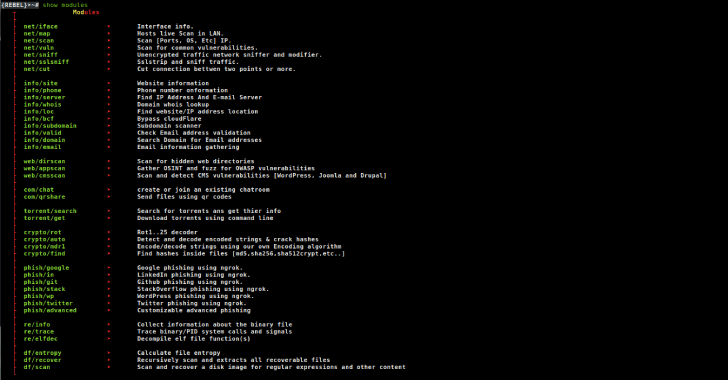Number one of the biggest security holes are passwords, as every password security study shows. Thc Hydra is a proof of concept code, to give researchers and security consultants the possibility to show how easy it would be to gain unauthorized access from remote to a system.
THIS TOOL IS FOR LEGAL PURPOSES ONLY!
There are already several login hacker tools available, however, none does either support more than one protocol to attack or support parallelized connects.
It was tested to compile cleanly on Linux, Windows/Cygwin, Solaris, FreeBSD/OpenBSD, QNX (Blackberry 10) and MacOS.
Currently this tool supports the following protocols: Asterisk, AFP, Cisco AAA, Cisco auth, Cisco enable, CVS, Firebird, FTP, HTTP-FORM-GET, HTTP-FORM-POST, HTTP-GET, HTTP-HEAD, HTTP-POST, HTTP-PROXY, HTTPS-FORM-GET, HTTPS-FORM-POST, HTTPS-GET, HTTPS-HEAD, HTTPS-POST, HTTP-Proxy, ICQ, IMAP, IRC, LDAP, MEMCACHED, MONGODB, MS-SQL, MYSQL, NCP, NNTP, Oracle Listener, Oracle SID, Oracle, PC-Anywhere, PCNFS, POP3, POSTGRES, RDP, Rexec, Rlogin, Rsh, RTSP, SAP/R3, SIP, SMB, SMTP, SMTP Enum, SNMP v1+v2+v3, SOCKS5, SSH (v1 and v2), SSHKEY, Subversion, Teamspeak (TS2), Telnet, VMware-Auth, VNC and XMPP.
You can always find the newest release/production version of hydra at its project page at https://github.com/vanhauser-thc/thc-hydra/releases If you are interested in the current development state, the public development repository is at Github: svn co https://github.com/vanhauser-thc/thc-hydra or git clone https://github.com/vanhauser-thc/thc-hydra Use the development version at your own risk. It contains new features and new bugs. Things might not work!
Also Read – Brutemap : Let’s Find Someone’s Account
HOW TO COMPILE
To configure, compile and install hydra, just type:
./configure
make
make install
If you want the ssh module, you have to setup libssh (not libssh2!) on your system, get it from http://www.libssh.org, for ssh v1 support you also need to add “-DWITH_SSH1=On” option in the cmake command line.
IMPORTANT: If you compile on MacOS then you must do this – do not install libssh via brew!
If you use Ubuntu/Debian, this will install supplementary libraries needed for a few optional modules (note that some might not be available on your distribution):
apt-get install libssl-dev libssh-dev libidn11-dev libpcre3-dev \
libgtk2.0-dev libmysqlclient-dev libpq-dev libsvn-dev \
firebird-dev libmemcached-dev
This enables all optional modules and features with the exception of Oracle, SAP R/3, NCP and the apple filing protocol – which you will need to download and install from the vendor’s web sites.
For all other Linux derivates and BSD based systems, use the system software installer and look for similarly named libraries like in the command above. In all other cases, you have to download all source libraries and compile them manually.
SUPPORTED PLATFORMS
- All UNIX platforms (Linux, *BSD, Solaris, etc.)
- MacOS (basically a BSD clone)
- Windows with Cygwin (both IPv4 and IPv6)
- Mobile systems based on Linux, MacOS or QNX (e.g. Android, iPhone, Blackberry 10, Zaurus, iPaq)
HOW TO USE
If you just enter hydra, you will see a short summary of the important options available. Type ./hydra -h to see all available command line options.
Note that NO login/password file is included. Generate them yourself. A default password list is however present, use “dpl4hydra.sh” to generate a list.
For Linux users, a GTK GUI is available, try ./xhydra
For the command line usage, the syntax is as follows: For attacking one target or a network, you can use the new “://” style: hydra [some command line options] PROTOCOL://TARGET:PORT/MODULE-OPTIONS The old mode can be used for these too, and additionally if you want to specify your targets from a text file, you must use this one:
hydra [some command line options] [-s PORT] TARGET PROTOCOL [MODULE-OPTIONS]
Via the command line options you specify which logins to try, which passwords, if SSL should be used, how many parallel tasks to use for attacking, etc.
PROTOCOL is the protocol you want to use for attacking, e.g. ftp, smtp, http-get or many others are available TARGET is the target you want to attack MODULE-OPTIONS are optional values which are special per PROTOCOL module
FIRST – select your target you have three options on how to specify the target you want to attack:
- a single target on the command line: just put the IP or DNS address in
- a network range on the command line: CIDR specification like “192.168.0.0/24”
- a list of hosts in a text file: one line per entry (see below)
SECOND – select your protocol Try to avoid telnet, as it is unreliable to detect a correct or false login attempt. Use a port scanner to see which protocols are enabled on the target.
THIRD – check if the module has optional parameters hydra -U PROTOCOL e.g. hydra -U smtp
FOURTH – the destination port this is optional! if no port is supplied the default common port for the PROTOCOL is used. If you specify SSL to use (“-S” option), the SSL common port is used by default.
If you use “://” notation, you must use “[” “]” brackets if you want to supply IPv6 addresses or CIDR (“192.168.0.0/24”) notations to attack: hydra [some command line options] ftp://[192.168.0.0/24]/ hydra [some command line options] -6 smtps://[2001:db8::1]/NTLM
Note that everything hydra does is IPv4 only! If you want to attack IPv6 addresses, you must add the “-6” command line option. All attacks are then IPv6 only!
If you want to supply your targets via a text file, you can not use the :// notation but use the old style and just supply the protocol (and module options): hydra [some command line options] -M targets.txt ftp You can supply also the port for each target entry by adding “:” after a target entry in the file, e.g.:
foo.bar.com
target.com:21
unusual.port.com:2121
default.used.here.com
127.0.0.1
127.0.0.1:2121
Note that if you want to attach IPv6 targets, you must supply the -6 option and must put IPv6 addresses in brackets in the file(!) like this:
foo.bar.com
target.com:21
[fe80::1%eth0]
[2001::1]
[2001::2]:8080
[2a01:24a:133:0:00:123:ff:1a]
LOGINS AND PASSWORDS
You have many options on how to attack with logins and passwords With -l for login and -p for password you tell hydra that this is the only login and/or password to try. With -L for logins and -P for passwords you supply text files with entries. e.g.:
hydra -l admin -p password ftp://localhost/
hydra -L default_logins.txt -p test ftp://localhost/
hydra -l admin -P common_passwords.txt ftp://localhost/
hydra -L logins.txt -P passwords.txt ftp://localhost/
Additionally, you can try passwords based on the login via the “-e” option. The “-e” option has three parameters:
s – try the login as password
n – try an empty password
r – reverse the login and try it as password
If you want to, e.g. try “try login as password and “empty password”, you specify “-e sn” on the command line.
But there are two more modes for trying passwords than -p/-P: You can use text file which where a login and password pair is separated by a colon, e.g.:
admin:password
test:test
foo:bar
This is a common default account style listing, that is also generated by the dpl4hydra.sh default account file generator supplied with hydra. You use such a text file with the -C option – note that in this mode you can not use -l/-L/-p/-P options (-e nsr however you can). Example:
hydra -C default_accounts.txt ftp://localhost/
And finally, there is a bruteforce mode with the -x option (which you can not use with -p/-P/-C):
-x minimum_length:maximum_length:charset
the charset definition is a for lowercase letters, A for uppercase letters, 1 for numbers and for anything else you supply it is their real representation. Examples:
-x 1:3:a generate passwords from length 1 to 3 with all lowercase letters
-x 2:5:/ generate passwords from length 2 to 5 containing only slashes
-x 5:8:A1 generate passwords from length 5 to 8 with uppercase and numbers
Example:
hydra -l ftp -x 3:3:a ftp://localhost/
Via the third command line parameter (TARGET SERVICE OPTIONAL) or the -m command line option, you can pass one option to a module. Many modules use this, a few require it!
To see the special option of a module, type:
hydra -U
e.g.
./hydra -U http-post-form
The special options can be passed via the -m parameter, as 3rd command line option or in the service://target/option format.
Examples (they are all equal):
./hydra -l test -p test -m PLAIN 127.0.0.1 imap
./hydra -l test -p test 127.0.0.1 imap PLAIN
./hydra -l test -p test imap://127.0.0.1/PLAIN
RESTORING AN ABORTED/CRASHED SESSION
When hydra is aborted with Control-C, killed or crashes, it leaves a “hydra.restore” file behind which contains all necessary information to restore the session.
This session file is written every 5 minutes. NOTE: the hydra.restore file can NOT be copied to a different platform (e.g. from little endian to big endian, or from Solaris to AIX)
HOW TO SCAN/CRACK OVER A PROXY
The environment variable HYDRA_PROXY_HTTP defines the web proxy (this works just for the http services!). The following syntax is valid:
HYDRA_PROXY_HTTP=”http://123.45.67.89:8080/”
HYDRA_PROXY_HTTP=”http://login:password@123.45.67.89:8080/”
HYDRA_PROXY_HTTP=”proxylist.txt”
The last example is a text file containing up to 64 proxies (in the same format definition as the other examples).
For all other services, use the HYDRA_PROXY variable to scan/crack. It uses the same syntax. eg:
HYDRA_PROXY=connect|socks4|socks5]://[login:password@]proxy_addr:proxy_port
for example:
HYDRA_PROXY=connect://proxy.anonymizer.com:8000
HYDRA_PROXY=socks4://auth:pw@127.0.0.1:1080
HYDRA_PROXY=socksproxylist.txt
ADDITIONAL HINTS
- sort your password files by likelihood and use the -u option to find passwords much faster!
- uniq your dictionary files! this can save you a lot of time 🙂 cat words.txt | sort | uniq > dictionary.txt
- if you know that the target is using a password policy (allowing users only to choose a password with a minimum length of 6, containing a least one letter and one number, etc. use the tool pw-inspector which comes along with the hydra package to reduce the password list: cat dictionary.txt | pw-inspector -m 6 -c 2 -n > passlist.txt
The results are output to stdio along with the other information. Via the -o command line option, the results can also be written to a file. Using -b, the format of the output can be specified. Currently, these are supported:
text– plain text formatjsonv1– JSON data using version 1.x of the schema (defined below).json– JSON data using the latest version of the schema, currently there is only version 1.
If using JSON output, the results file may not be valid JSON if there are serious errors in booting Hydra.
Here is an example of the JSON output. Notes on some of the fields:
errormessages– an array of zero or more strings that are normally printed to stderr at the end of the Hydra’s run. The text is very free form.success– indication if Hydra ran correctly without error (NOT if passwords were detected). This parameter is either the JSON valuetrueorfalsedepending on completion.quantityfound– How many username+password combinations discovered.jsonoutputversion– Version of the schema, 1.00, 1.01, 1.11, 2.00, 2.03, etc. Hydra will make second tuple of the version to always be two digits to make it easier for downstream processors (as opposed to v1.1 vs v1.10). The minor-level versions are additive, so 1.02 will contain more fields than version 1.00 and will be backward compatible. Version 2.x will break something from version 1.x output.
Version 1.00 example:
{
“errormessages”: [
“[ERROR] Error Message of Something”,
“[ERROR] Another Message”,
“These are very free form”
],
“generator”: {
“built”: “2019-03-01 14:44:22”,
“commandline”: “hydra -b jsonv1 -o results.json … …”,
“jsonoutputversion”: “1.00”,
“server”: “127.0.0.1”,
“service”: “http-post-form”,
“software”: “Hydra”,
“version”: “v8.5”
},
“quantityfound”: 2,
“results”: [
{
“host”: “127.0.0.1”,
“login”: “bill@example.com”,
“password”: “bill”,
“port”: 9999,
“service”: “http-post-form”
},
{
“host”: “127.0.0.1”,
“login”: “joe@example.com”,
“password”: “joe”,
“port”: 9999,
“service”: “http-post-form”
}
],
“success”: false
}
BUGS & FEATURES
Hydra: Email me or David if you find bugs or if you have written a new module. vh@thc.org (and put “antispam” in the subject line)
You should use PGP to encrypt emails to vh@thc.org :
—–BEGIN PGP PUBLIC KEY BLOCK—–
Version: GnuPG v3.3.3 (vh@thc.org)
mQINBFIp+7QBEADQcJctjohuYjBxq7MELAlFDvXRTeIqqh8kqHPOR018xKL09pZTKiBWFBkU48xlR3EtV5fC1yEt8gDEULe5o0qtK1aFlYBtAWkflVNjDrs+Y2BpjITQFnAPHw0SOOT/jfcvmhNOZMzMU8lIubAVC4cVWoSWJbLTv6e0DRIPiYgXNT5Quh6cvqhnI1C39pEo/W/nh3hSa16oTc5dtTLbi5kEbdzml78TnT0OASmWLI+xtYKnP+5kXv4xrXRMVk4L1Bv9WpCY/Jb6J8K8SJYdXPtbaIi4VjgVr5gvg9QC/d/QP2etmw3plJ1Ldv63x6nXsxnPq6MSOOw8+QqKc1dAgIA43k6SU4wLq9TB3x0uTKnnB8pA3ACIzPeRN9LFkr7v1KUMeKKEdu8jUut5iKUJVu63lVYxuM5ODb6Owt3+UXgsSaQLu9nIDZqnp/M6YTCJTJ+cJANN+uQzESI4Z2m9ITg/U/cuccN/LIDg8/eDXW3VsCqJz8BflBSwMItMhs/Qwzqc1QCKfY3xcNGc4aFlJz4Bq3zSdw3mUjHYJYv1UkKntCtvvTCNDiomxyBEKB9J7KNsOLI/CSst3MQWSG794r9ZjcfA0EWZ9u6929F2pGDZ3LiS7Jx5n+gdBDMe0PuuonLIGXzyIuMrkfoBeW/WdnOxh+27eemcdpCb68XtQCw6UQARAQABtB52YW4gSGF1c2VyICgyMDEzKSA8dmhAdGhjLm9yZz6JAjkEEwECACMCGwMCHgECF4AFAlIp/QcGCwkIAwcCBhUKCQgLAgUWAwIBAAAKCRDI8AEqhCFiv2R9D/9qTCJJxCH4BUbWIUhw1zRkn9iCVSwZMmfaAhz5PdVTjeTelimMh5qwK2MNAjpR7vCCd3BHZ2VLB2Eoz9MOgSCxcMOnCDJjtCdCOeaxiASJt8qLeRMwdMOtznM8MnKCIO8X4oo4 qH8eNj83KgpI50ERBCj/EMsgg07vSyZ9i1UXjFofFnbHRWSW9yZO16qD4F6r4SGzdsfXARcO3QRI5lbjdGqm+g+HOPj1EFLAOxJAQOygz7ZN5fj+vPp+G/drONxNyVKpQFtENpvqPdU9CqYh8ssazXTWeBi/TIs0q0EXkzqo7CQjfNb6tlRsg18FxnJDK/gaV/1umTg41bQuVP9gGmycsiNI8Atr5DWqaF+O4uDmQxcxS0kX2YXQ4CSQJFi0pml5slAGL8HaAUbV7UnQEqpayPyyTEx1i0wK5ZCHYjLBfJRZCbmHX7SbviSAzKdo5JIlAtuk+atgW3vC3hDTrBu5qlsFCZvbxS21PJ+9zmK7ySjAEFH/NKFmx4B8kb7rPAOM0qCTv0pD/e4ogJCxVrqQ2XcCSJWxJL31FNAMnBZpVzidudNURG2v61h3ckkSB/fPJnkRy/yxYWrdFBYkURImxD8iFD1atj1n3EI5HBL7p/9mHxf1DVJWz7rYQk+3czvsIhBz7xGBz4nhpCi87VDEYttghYlJanbiRfNh3okCOAQTAQIAIgUCUin7tAIbAwYLCQgHAwIGFQgCCQoLBBYCAwECHgECF4AACgkQyPABKoQhYr8OIA//cvkhoKay88ySAjMQypach8C5CvP7eFCT11pkCt1DMAO/8Dt6Y/Ts10dPjohGdIX4PkoLTkQDwBDJHoLO75oqj0CYLlqDI4oHgf2uzd0Zv8f/11CQQCtut5oEK72mGNzv3GgVqg60z2KR2vpxvGQmDwpDOPP620tf/LuRQgBpks7uazcbkAE2Br09YrUQSCBNHy8kirHW5m5CnupMrcvuFx7mHKW1z3FuhM8ijG7oRmcBWfVoneQgIT3l2WBniXg1mKFhuUSV8ErcXIcc11qsKshyqh0GWb2JfeXbAcTW8/4IwrCP+VfAyLO9F9khP6SnCmcNF9EVJyR6Aw+JMNRin7PgvsqbFhpkq9N+gVBAufz3DZoMTEbsMTtW4lYG6HMWhza2+8G9XyaL ARAWhkNVsmQQ5T6qGkI19thB6E/T6ZorTxqeopNVA7VNK3RVlKpkmUu07w5bTD6Vl3Ti6XfcSQqzt6YX2/WUE8ekEG3rSesuJ5fqjuTnIIOjBxr+pPxkzdoazlu2zJ9Fn24fHvlU20TccEWXteXj9VFzV/zbPEQbEqmE16lV+bO8U7UHqCOdE83OMrbNKszl7LSCbFhCDtflUsyClBt/OPnlLEHgEE1j9QkqdFFy90l4HqGwKvx7lUFDnuF8LYsb/hcP4XhqjiGcjTPYBDK254iYrpOSMZSIRgQQEQIABgUCUioGfQAKCRBDlBVOdiiituddAJ4zMrge4qzajScIQcXYgIWMXVenCQCfYTNQPGkHVyp3dMhJ0NR21TYoYMC5Ag0EUin7tAEQAK5/AEIBLlA/TTgjUF3im6nu/rkWTM7/gs5H4W0a04kF4UPhaJURgCNlDfUnBFA0QD7Jja5LHYgLdoHXiFelPhGrbZel/Sw6sH2gkGCBtFMrVkm3u7ttx3AZlprqqRH68Y5xTCEjGRncCAmaDgd2apgisJqXpu0dRDroFYpJFNH3vw9N2a620ShNakYP4ykVG3jTDC4MSl2q3BO5dzn8GYFHU0CNz6nf3gZR+48BG+zmAT77peTS+C4Mbd6LmMmB0cuS2kYiFRwE2B69UWguLHjpXFcu9/85JJVCl2CIab7l5hpqGmgwG/yW8HFK04Yhew7ZJOXJfUYlv1EZzR5bOsZ8Z9inC6hvFmxuCYCFnvkiEI+pOxPAoeNOkMaT/W4W+au0ZVt3Hx+oD0pkJb5if0jrCaoAD4gpWOte6LZA8mAbKTxkHPBrrA9/JFis5CVNI688O6eDiJqCCJjPOQA+COJI+0V+tFa6XyHPB4LxA46RxtumUZMCv/06sDJlXMNpZbSd5Fq95YfZd4l9Vr9VrvKXfbomn+akwUymP8RDyc6Z8BzjF4Y502m6Ts0J0MnSYfEDqJPPZbMGB+GAgAqLs7FrZJQzOZTiOXOSIJsKMYsPIDWE8lXvs77rs0rGvgvQfWzPsJlMIx6ryrMnAsfOkzM2GChGNX9+pABpgOdYII4bABEBAAGJAh8EGAECAAkFAlIp+7QCGwwACgkQyPABKoQhYr+hrg/9Er0+HN78y6UWGFHu/KVK d8M6ekaqjQndQXmzQaPQwsOHOvWdC+EtBoTdR3VIjAtX96uvzCRV3sb0XPB9S9ePgRrO/t5+qTVTtjua1zzjZsMOr1SxhBgZ5+0U2aoY1vMhyIjUuwpKKNqj2uf+uj5YZQbCNklghf7EVDHsYQ4goB9gsNT7rnmrzSc6UUuJOYI2jjtHp5BPMBHh2WtUVfYP8JqDfQ+eJQr5NCFB24xMW8OxMJit3MGckUbcZlUa1wKiTb0b76fOjt0y/+9u1ykdX+i27DAM6PniFG8BfqPq/E3iU20IZGYtaAFBuhhDWR3vGY4+r3OxdlFAJfBG9XDDaEDTzv1XF+tEBo69GFaxXZGdk9//7qxcgiya4LL9Kltuvs82+ZzQhC09p8d3YSQNcfaYObm4EwbINdKP7cr4anGFXvsLC9urhow/RNBLiMbRX/5qBzx2DayXtxEnDlSCMh7wCkNDYkSIZOrPVUFOCGxu7lloRgPxEetM5x608HRa3hDHoe5KvUBmmtavB/aRzlGuZP1S6Y7S13ytiULSzTfUxJmyGYgNo+4ygh0i6Dudf9NLmV+i9aEIbLbd6bni1B/y8hBSx3SVb4sQVRe3clBkfS1/mYjlldtYjzOwcd02x599KJlcChf8HnWFB7qTzB3yrr+vYBT0uDWmxwPjiJs= =ytEf
—–END PGP PUBLIC KEY BLOCK—–

















